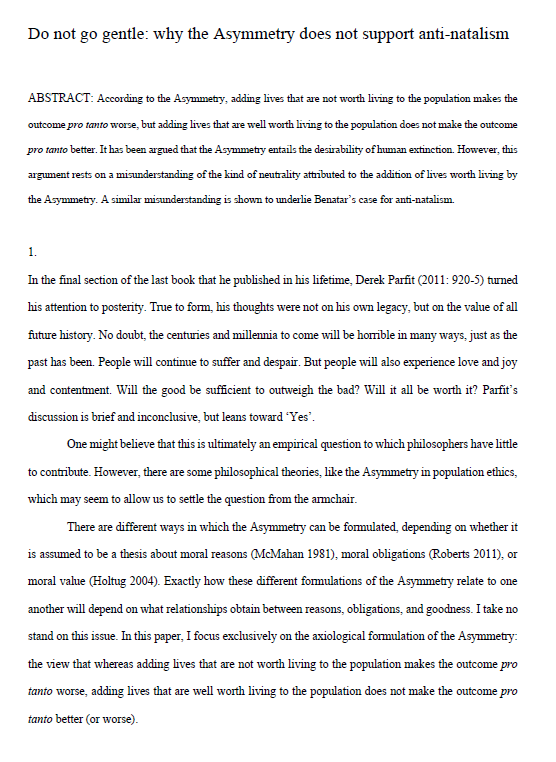Do not go gentle: why the Asymmetry does not support anti-natalism
Andreas Mogensen (Global Priorities Institute, Oxford University)
GPI Working Paper No. 3-2021
According to the Asymmetry, adding lives that are not worth living to the population makes the outcome pro tanto worse, but adding lives that are well worth living to the population does not make the outcome pro tanto better. It has been argued that the Asymmetry entails the desirability of human extinction. However, this argument rests on a misunderstanding of the kind of neutrality attributed to the addition of lives worth living by the Asymmetry. A similar misunderstanding is shown to underlie Benatar’s case for anti-natalism.
Other working papers
The evidentialist’s wager – William MacAskill, Aron Vallinder (Global Priorities Institute, Oxford University) Caspar Österheld (Duke University), Carl Shulman (Future of Humanity Institute, Oxford University), Johannes Treutlein (TU Berlin)
Suppose that an altruistic and morally motivated agent who is uncertain between evidential decision theory (EDT) and causal decision theory (CDT) finds herself in a situation in which the two theories give conflicting verdicts. We argue that even if she has significantly higher credence in CDT, she should nevertheless act …
Three mistakes in the moral mathematics of existential risk – David Thorstad (Global Priorities Institute, University of Oxford)
Longtermists have recently argued that it is overwhelmingly important to do what we can to mitigate existential risks to humanity. I consider three mistakes that are often made in calculating the value of existential risk mitigation: focusing on cumulative risk rather than period risk; ignoring background risk; and neglecting population dynamics. I show how correcting these mistakes pushes the value of existential risk mitigation substantially below leading estimates, potentially low enough to…
Misjudgment Exacerbates Collective Action Problems – Joshua Lewis (New York University) et al.
In collective action problems, suboptimal collective outcomes arise from each individual optimizing their own wellbeing. Past work assumes individuals do this because they care more about themselves than others. Yet, other factors could also contribute. We examine the role of empirical beliefs. Our results suggest people underestimate individual impact on collective problems. When collective action seems worthwhile, individual action often does not, even if the expected ratio of costs to benefits is the same. …

